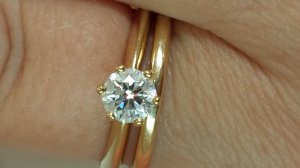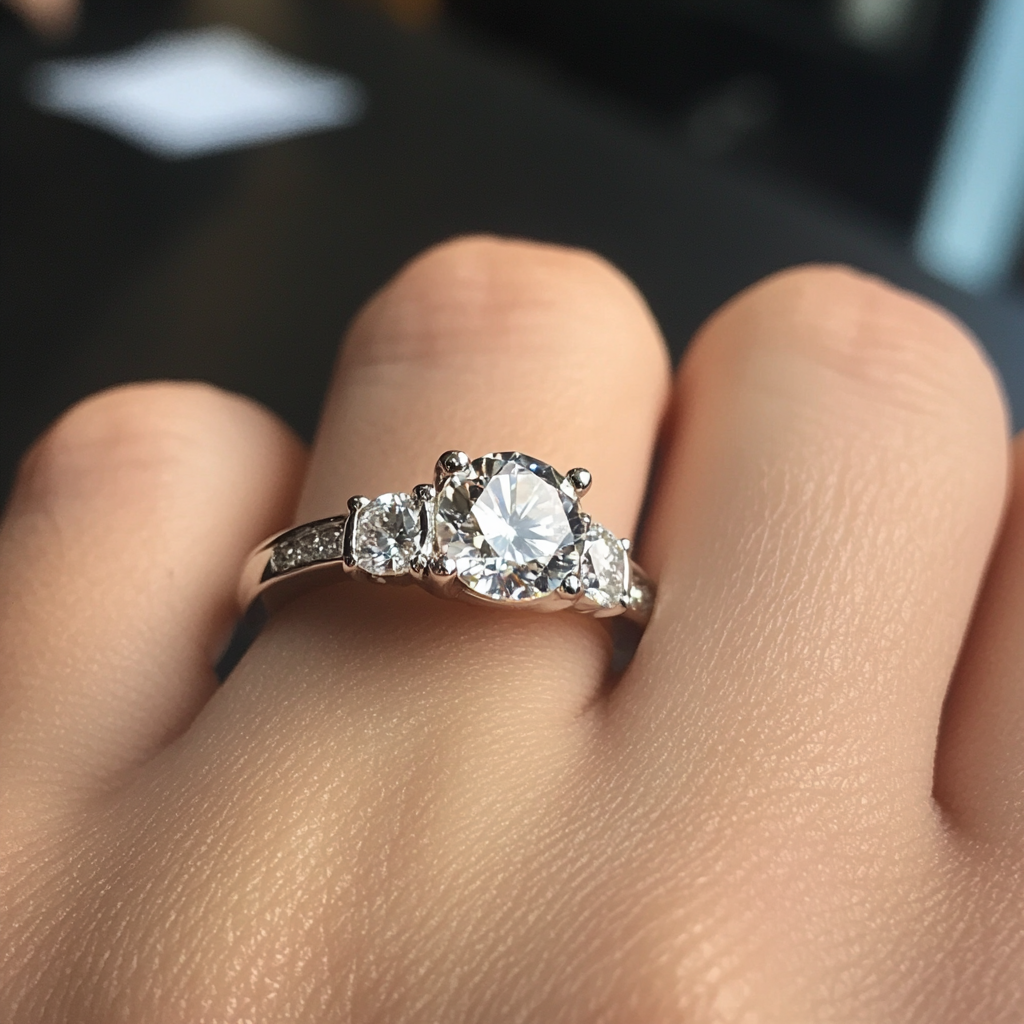Supersleuth50
Rough_Rock
- Joined
- Sep 3, 2013
- Messages
- 61
The simple and effective way to clean my diamond ring: I use oil to remove oil before using detergent
I have a simple 18k yellow gold solitaire in a six prong setting.
I would be very interested to hear what the professionals on this site think of this method because it is very cheap, quick and simple and doesn’t involve boiling water, commercial jewellery cleaners, ultrasound, or toothbrushes. The results are excellent and, unlike other methods, this method not involve metal expansion/contraction metal fatigue, abrasive chemicals or mechanical damage to the setting.
Items needed:
A. A sink with a plug in it (the plug is very important);
B. Two egg cups;
C. Baby oil - this is basically mineral oil (with a little fragrance added) that is used to oil babies’ skin;
D. Washing-up liquid (I think that this is called dishwashing liquid in America – it’s the stuff you use to manually wash the dishes);
E. Optional: Windolene (this is a window-glass cleaner, another brand is Mr Muscle, and contains alcohol/acetone);
F. Supply of water.
Method
1. I place the plug in the sink (very important!).
2. I place my diamond ring in the first egg cup.
3. I pour baby oil into the egg cup until the diamond ring is completely covered.
4. I wait 30 seconds.
5. I remove the ring from the egg cup and rinse the ring thoroughly in cold water.
6. I place the ring in the second egg cup.
7. I pour washing-up liquid (dishwashing liquid) into the egg cup until the ring is covered.
8. I wait 30 seconds.
9. I dilute the washing-up liquid in the egg cup with water (about three parts water to one part washing-up liquid) and gently swirl the liquid.
10. I wait 30 seconds.
11. I remove the ring from the egg cup and thoroughly rinse the ring in cold water.
12. [Optional: I then squirt Windolene glass cleaner on the surface of the diamond and then immediately rinse the ring thoroughly in cold water]
13. I put the ring back on my finger and let the diamond air dry
14. Voila!
Technical bit.
1. Diamonds attract oil. This is inevitable.
2. Oil on the surface of a diamond is easy to remove with detergent providing that the oil hasn’t been there for very long. However, if oil is left on the diamond’s surface for any length of time the oil gradually reacts with air and becomes much more difficult to remove. In short, ‘new’ oil is easy to remove from a diamond but ‘old’ oil is difficult to remove.
3. Oil dissolves in oil (oil is a very good solvent) and therefore that if we dip a diamond covered in old oil into some new unreacted oil then the old oil will dissolve in the new oil and leave the surface. The diamond is now covered in new oil that is easy to remove with detergent.
This principle is already used in cleaning oil and fingerprints off stainless steel.
Miscellaneous
In case you are wondering why I cover the ring with washing-up liquid and then dilute it, I do this because in the UK the washing-up liquid is more viscous than baby oil and so I’m ensuring that the (diluted) washing-up liquid reaches all the areas of the ring that the oil might have adhered to. I’m not sure whether this diluting stage is necessary but I do it anyway. The optional Windolene ensures that there are no smears or deposits from the washing-up liquid left on the surface of the diamond.
Limitations and safety
[Please note that I have only used this method on diamonds and not on other gemstones. I have no information on the long term effects of this method. I have not used this method on white gold or platinum. I have not used this method on pave or complicated settings. I am careful to keep the products mentioned away from my eyes.]
I have a simple 18k yellow gold solitaire in a six prong setting.
I would be very interested to hear what the professionals on this site think of this method because it is very cheap, quick and simple and doesn’t involve boiling water, commercial jewellery cleaners, ultrasound, or toothbrushes. The results are excellent and, unlike other methods, this method not involve metal expansion/contraction metal fatigue, abrasive chemicals or mechanical damage to the setting.
Items needed:
A. A sink with a plug in it (the plug is very important);
B. Two egg cups;
C. Baby oil - this is basically mineral oil (with a little fragrance added) that is used to oil babies’ skin;
D. Washing-up liquid (I think that this is called dishwashing liquid in America – it’s the stuff you use to manually wash the dishes);
E. Optional: Windolene (this is a window-glass cleaner, another brand is Mr Muscle, and contains alcohol/acetone);
F. Supply of water.
Method
1. I place the plug in the sink (very important!).
2. I place my diamond ring in the first egg cup.
3. I pour baby oil into the egg cup until the diamond ring is completely covered.
4. I wait 30 seconds.
5. I remove the ring from the egg cup and rinse the ring thoroughly in cold water.
6. I place the ring in the second egg cup.
7. I pour washing-up liquid (dishwashing liquid) into the egg cup until the ring is covered.
8. I wait 30 seconds.
9. I dilute the washing-up liquid in the egg cup with water (about three parts water to one part washing-up liquid) and gently swirl the liquid.
10. I wait 30 seconds.
11. I remove the ring from the egg cup and thoroughly rinse the ring in cold water.
12. [Optional: I then squirt Windolene glass cleaner on the surface of the diamond and then immediately rinse the ring thoroughly in cold water]
13. I put the ring back on my finger and let the diamond air dry
14. Voila!
Technical bit.
1. Diamonds attract oil. This is inevitable.
2. Oil on the surface of a diamond is easy to remove with detergent providing that the oil hasn’t been there for very long. However, if oil is left on the diamond’s surface for any length of time the oil gradually reacts with air and becomes much more difficult to remove. In short, ‘new’ oil is easy to remove from a diamond but ‘old’ oil is difficult to remove.
3. Oil dissolves in oil (oil is a very good solvent) and therefore that if we dip a diamond covered in old oil into some new unreacted oil then the old oil will dissolve in the new oil and leave the surface. The diamond is now covered in new oil that is easy to remove with detergent.
This principle is already used in cleaning oil and fingerprints off stainless steel.
Miscellaneous
In case you are wondering why I cover the ring with washing-up liquid and then dilute it, I do this because in the UK the washing-up liquid is more viscous than baby oil and so I’m ensuring that the (diluted) washing-up liquid reaches all the areas of the ring that the oil might have adhered to. I’m not sure whether this diluting stage is necessary but I do it anyway. The optional Windolene ensures that there are no smears or deposits from the washing-up liquid left on the surface of the diamond.
Limitations and safety
[Please note that I have only used this method on diamonds and not on other gemstones. I have no information on the long term effects of this method. I have not used this method on white gold or platinum. I have not used this method on pave or complicated settings. I am careful to keep the products mentioned away from my eyes.]




300x240.png)